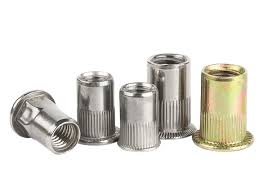The automotive industry is constantly evolving, with a relentless focus on improving vehicle performance and manufacturing efficiency. In this highly competitive sector, the choice of components makes a significant difference in the final product’s quality and durability. Among these components, fastening systems play a crucial role in ensuring that vehicles are both safe and reliable.
One such essential component is the rivet nut, which has become increasingly popular for its versatility and strength. These fasteners are not just simple connectors; they are necessary for maintaining the structural integrity of automotive assemblies. Their unique design and functionality offer several advantages that make them indispensable in automotive applications.
Enhancing Structural Integrity
One of the primary benefits of using these fasteners is their ability to reinforce the structural integrity of automotive assemblies. These fasteners are engineered to create strong, reliable connections, especially in materials that may be prone to damage from more aggressive fastening methods. Whether used in body panels or internal components, they provide a secure hold that withstands the stresses and vibrations typical in automotive environments.
Their ability to maintain material integrity is particularly important when dealing with thinner or more brittle materials. They ensure that the fastener does not compromise the overall strength of the component, making them an ideal choice for various automotive applications where durability and safety are paramount.
Streamlining the Assembly Process
Efficiency in the assembly line is crucial, and these fasteners significantly contribute to this by simplifying the process. One of their standout features is the ability to be installed from one side of the workpiece, eradicating the need for access to both sides. This feature, commonly associated with blind nut fasteners, allows for faster installation and reduces labour costs.
Additionally, these fasteners do not require specialised tools or extensive training to install, making the process straightforward and accessible. This ease of use is a major advantage in the automotive industry, where time and precision are critical to maintaining production schedules.
Versatile Applications Across Different Materials
Another reason these fasteners are so widely used in the automotive sector is their versatility. They can be applied to a range of materials, including metal, plastic, and composite substances. This flexibility makes them suitable for various parts of a vehicle, from the chassis to interior fittings.
Furthermore, these fasteners come in multiple sizes and materials, allowing manufacturers to choose the most appropriate option for each specific application. This adaptability ensures that they meet the diverse needs of automotive design and manufacturing, providing consistent performance across all applications.
Minimising Secondary Operations
Reducing the need for additional operations like welding, tapping, or drilling can save significant time and costs in manufacturing. These fasteners help achieve this by providing a ready-to-use, threaded insert once installed. The elimination of secondary steps not only accelerates the production process but also reduces the likelihood of errors or defects.
By streamlining the process and minimising the need for additional operations, these fasteners contribute to a more efficient and cost-effective manufacturing environment. This benefit is especially valuable in large-scale automotive production, where efficiency directly impacts profitability.
Facilitating Maintenance and Repairs
Vehicles require regular maintenance, and the use of these fasteners makes servicing easier and more efficient. Unlike permanent fastening methods, these fasteners allow for easy removal and reinstallation of components without damaging the surrounding material. This feature is particularly useful in areas that need frequent access, such as engine bays or interior panels.
By incorporating rivet nut inserts, manufacturers ensure that maintenance and repair tasks can be taken out swiftly, reducing downtime and ensuring the longevity of the vehicle. This comfort of maintenance is a key factor in the continued popularity of these fasteners in the automotive industry.
The use of rivet nuts in automotive applications presents a range of benefits that enhance both the manufacturing process and the final product. As the automotive sector evolves, the role of these nuts in ensuring vehicle safety and performance remains as vital as ever. Their continued use will undoubtedly contribute to the future success of automotive innovations and advancements.

